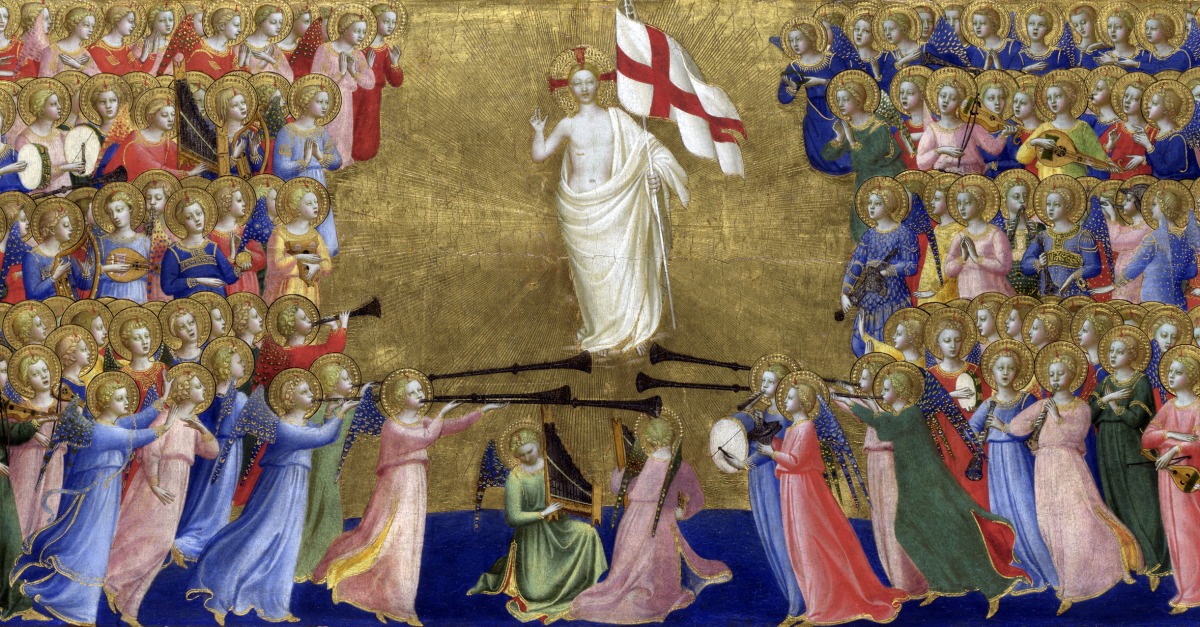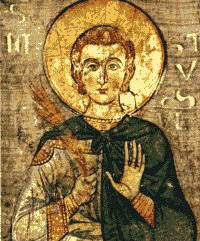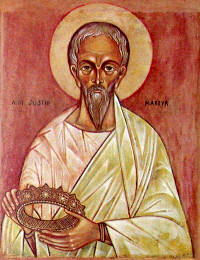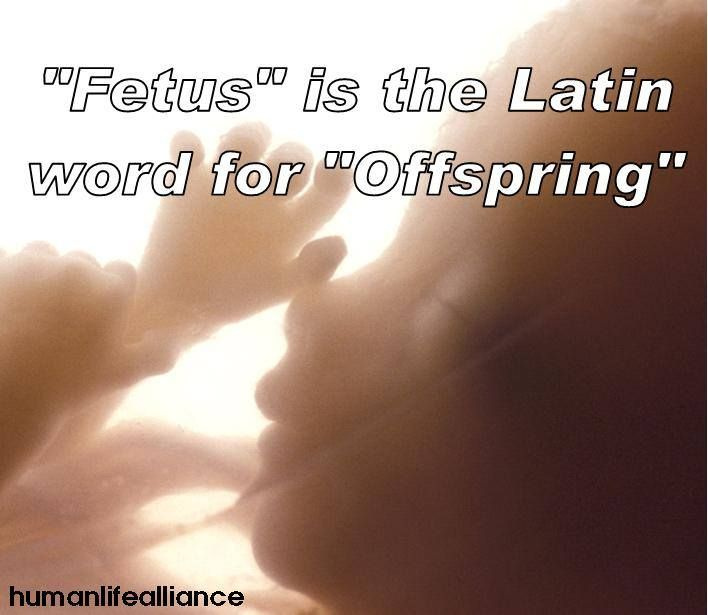20. Neither pray I for these alone but for them also which shall believe on me through their word;
21. That they all may be one; as you, Father, is in me, and I in You, that they also may be one in us: that the world may believe that you have sent me.
22. And the glory which you gave me I have given them; that they may be one, even as we are one:
23. I in them, and you in me, that they may be made perfect in one: and that the world may know that you have sent me, and have loved them, as you have loved me.
AUG. When our Lord had prayed for His disciples, whom He named also Apostles, He added a prayer for all others who should believe on Him; Neither pray I for these alone, but for all others who shall believe of Me through their word.
CHRYS. Another ground of consolation to them, that they were to be the cause of the salvation of others.
AUG. All, i.e. not only those who were then alive, but those who were to be born; not those only who heard the Apostles themselves, but us who were born long after their death. We have all believed in Christ through their word: for they first heard that word from Christ, and then preached it to others, and so it has come down, and will go down to all posterity. We may see that in this prayer there are some disciples whom He does not pray for; for those, i.e. who were neither with Him at the time, nor were about to believe on Him afterwards through the Apostles' word, but believed already.
Was Nathanael with Him then, or Joseph of Arimathea, and many others, who, John says, believed on Him? I do not mention old Simon, or Anna the prophetess, Zacharias, Elisabeth, or John the Baptist; for it might be answered that it was not necessary to pray for dead persons, such as these who departed with such rich merits. With respect to the former then we must understand that they did not yet believe in Him, as He wished, but that after His resurrection, when the Apostles were taught and strengthened by the Holy Spirit, they attained to a right faith.
The case of Paul however still remains, An Apostle not of men, or by men; and that of the robber, who believed when even the teachers themselves of the faith fell away. We must understand then, their word, to mean the word of faith itself which they preached to the world; it being called their word, because it was preached in the first instance and principally by them; for it was being preached by them, when Paul received it by revelation from Jesus Christ Himself. And in this sense the robber too believed their word. Wherefore in this prayer the Redeemer prays for all whom He redeemed, both present and to come.
And then follows the thing itself which He prays for, That they all may be one. He asks that for all, which he asked above for the disciples; that all both we and they may be one.
CHRYS. And with this prayer for unanimity, He concludes His prayer; and then begins a discourse on the same subject: A new commandment I give to you, that you love one another.
HILARY. And this unity is recommended by the great example of unity: As you, Father, are in Me, and I in you, that they also may be one in Us, i.e. that as the Father is in the Son, and the Son in the Father, so after the likeness of this unity, all may be one in the Father and in the Son.
CHRYS. This as again does not express perfect likeness, but only likeness as far as it was possible in men; as when He says, Be you merciful, even as your Father, which is in heaven, is merciful.
AUG. We must particularly observe here, that our Lord did not say, that we may be all one, but that they may be all one, as you, Father, in Me, and I in You, are one, understood. For the Father is so in the Son, that They are one, because They are of one substance; but we can be one in Them, but not with Them; because we and They are not of one substance. They are in us, and we in Them, so as that They are one in Their nature, we one in ours. They are in us, as God is in the temple; we in Them, as the creature is in its Creator. Wherefore He adds, in Us, to show, that our being made one by charity, is to be attributed to the grace of God, not to ourselves.
AUG. Or that in ourselves we cannot be one, severed from each other by diverse pleasures, and lusts, and the pollution of sin, from which we must be cleansed by a Mediator, in order to be one in Him.
HILARY. Heretics endeavoring to get over the words, I and My Father are one, as a proving unity of nature, and to reduce them to mean a unity simply of natural love, and agreement of will, bring forwards these words of our Lord's as an example of this kind of unity: That they may be all one, as You, Father, is in Me, and I in You.
But though impiety can cheat its own understanding, it cannot alter the meaning of the words themselves. For they who are born again of a nature that gives unity in life eternal, they cease to be one in will merely, acquiring the same nature by their regeneration: but the Father and Son alone are properly one, because God, only-begotten of God, can only exist in that nature from which He is derived.
AUG. But why does He say, That the world may believe that you have sent Me? Will the world believe when we shall all be one in the Father and the Son? Is not this unity that peace eternal, which is the reward of faith, rather than faith itself? For though in this life all of us who hold in the same common faith are one, yet even this unity is not a means to belief, but the consequence of it.
What means then, That all may be one, that the world may believe? He prays for the world when He says, Neither pray I for these alone, but for all those who shall believe on Me through their word. Whereby it appears that He does not make this unity the cause of the world believing, but prays that the world may believe, as He prays that they all may be one. The meaning will be clearer if we always put in the word ask; I ask that they all may be one; I ask. that they may be one in Us; I ask that the world may believe that you have sent Me.
HILARY. Or, the world will believe that the Son is sent from the Father, for that reason, viz. because all who believe in Him are one in the Father and the Son.
CHRYS. For there is no scandal so great as division, whereas unity amongst believers is a great argument for believing; as He said at the beginning of His discourse, By this shall all men know that you are My disciples, if you have love one to another. For if they quarrel, they will not be looked on as the disciples of a peacemaking Master. And I, He says, not being a peacemaker, they will not acknowledge Me as sent from God.
AUG. Then our Savior, Who, by praying to the Father, showed Himself to be man, now shows that, being God with the Father, He does what He prays for: And the glory which you gave Me, I have given them. What glory, but immortality, which human nature was about to receive in Him? For that which was to be by unchangeable predestination, though future, He expresses by the past tense. That glory of immortality, which He says was given Him by the Father, we must understand He gave Himself also.
For when the Son is silent of His own cooperation in the Father's work, He shows His humility: when He is silent of the Father's cooperation in His work, He shows His equality. In this way here He neither disconnects Himself with the Father's work, when He says, The glory which you gave Me, nor the Father with His work, when He says, I have given them. But as He was pleased by prayer to the Father to obtain that all might be one, so now He is pleased to effect the same by His own gift; for He continues, That all may be one, even as We are one.
CHRYS. By glory, He means miracles, and doctrines and unity; which latter is the greater glory. For all who believed through the Apostles see one. If any separated, it was owing to men's own carelessness; not but that our Lord anticipates this happening.
HILARY. By this giving and receiving of honor, then, all are one. But I do not yet apprehend in what way this makes all one. Our Lord, however, explains the gradation and order in the consummating of this unity, when He adds, I in them, and You in Me; so that inasmuch as He was in the Father by His divine nature, we in Him by His incarnation, and He again in us by the mystery of the sacrament, a perfect union by means of a Mediator was established.
CHRYS. Elsewhere He says of Himself and the Father, We will come and make Our abode with Him; by the mention of two persons, stopping the mouths of the Sabellians. Here by saying that the Father comes to the disciples through Him, He refutes the notion of the Arians.
AUG. Nor is this said, however, as if to mean that the Father was not in us, or we in the Father. He only means to see, that He is Mediator between God and man. And what He adds, That they may be made perfect in one, shows that the reconciliation made by this Mediator, was carried on even to the enjoyment of everlasting blessedness. So what follows, That the world may know that you have sent Me, must not be taken to mean the same as the words just above.
That the world may believe. For as long as we believe what we do not see, we are not yet made perfect, as we shall be when we hare merited to see what we believe. So that when He speaks of their being made perfect, we are to understand such a knowledge as shall be by sight not such as is by faith. These that believe are the world, not a permanent enemy, my, but changed from an enemy to a friend; as it follows: And has loved them, as you has loved Me. The Father loves us in the Son, because He elected us in Him.
These words do not prove that we are equal to the Only-Begotten Son; for this mode of expression, as one thing so another, does not always signify equality. It sometimes only means, because cause one thing, therefore another. And this is its meaning here: You have loved them, as you have loved Me, i. e. You have loved them, because you have loved Me. There is no reason for God loving His members, but that He loves him, But since He hates nothing that He has made, who can adequately express how much He loves the members of His Only-Begotten Son, and still more the Only-Begotten Himself.
24. Father, I will that they also, whom you have given me, be with me where I am; that they may behold my glory, which you have given me: for you loved me before the foundation of the world.
25. O righteous Father, the world has not known you: but I have known you, and these have known that you have sent me.
26. And I have declared to them your name, and will declare it: that the love wherewith you has loved me may be in them, and I in them,
CHRYS. After He has said that many should believe on Him through them, and that they should obtain great glory, He then speaks of the crowns in store for them; Father, 1 will that they also whom you have given Me, be with Me; where I am.
AUG. These are they whom He has received from the Father, whom He also chose out of the world; as He says at the beginning of this prayer, you have given Him power over all flesh, i.e. all mankind, That He should give eternal life to as many as you have given Him. Wherein He shows that He had received power over all men, to deliver whom He would and to condemn whom He would. Wherefore it is to all His members that He promises this reward, that where He is they may be also. Nor can that but be done, which the Almighty Son says that He wishes to the Almighty Father: for the Father and the Son have one will, which, if weakness prevent us from comprehending, piety must believe. Where I am; so far as pertains to the creature, He w as made of the seed of David according to the flesh: He might say, Where I am, meaning where He was shortly to be, i.e. heaven. In heaven then, He promises us, we shall be. For there was the form of a servant raised, which He had taken from the Virgin, and there placed on the right hand of God.
GREG. What means then what the Truth says above, No man has ascended into heaven, but He that came down from heaven, even the Son of man which is in heaven. Yet here is no discrepancy for our Lord being the Head of His members, the reprobates excluded, He is alone with us. And therefore, we making one with Him, whence He came alone in Himself, there; He returns alone in us.
AUG. But as respects the form of God, wherein He is equal to the Father, if we understand these words, that they may he with Me where I am, with reference to that, then an away with all bodily ideas, and inquire, not where the Son, Who is equal to the Father, is: for no one has discovered where He is not. Wherefore it was not enough for Him to say, I will that they may be where I am, but He adds, with Me. For to be with Him is the great good: even the miserable can be where He is, but only the happy can be with Him. And as in the case of the visible though very different be whatever example we take, a blind man will serve for one, as a blind man though He is where the light is, yet is not himself with the light, but is absent from it in its presence, so not only the unbelieving, but the believing, though they cannot be where Christ is not, yet are not themselves with Christ by sight: by faith we cannot doubt but that a believer is with Christ. But here He is speaking of that sight wherein we shall see Him as He is; as He adds, That they may behold My glory, which you have given Me. That they may behold, He says, not, that they may believe. It is the reward of faith which He speaks of, not faith itself.
CHRYS. he says not, that they may partake of My glory, but, that they may behold, intimating that the rest there is to see the Son of God. The Father gave Him glory, when He begat Him.
AUG. When then we shall have seen the glory which the Father gave the Son, though by this glory we do not understand here, that which He gave to the equal Son when He begat Him, but that which He gave to the Son of man, after His crucifixion; then shall the judgment be, then shall the wicked be taken away, that he see not the glory of the Lord: what glory but that whereby He is God? If then we take their words, That they may be if with Me where I am, to be spoken by Him as Son of God, in that case they must have a higher meaning, viz. that we shall be in the Father with Christ. As He immediately adds, That they may see My glory which you have given Me; and then, Which you gave Me before the foundation of the world. For in Him He loved us before the foundation of the world, and then predestined what He should do at the end of the world.
BEDE. That which He calls glory then is the love wherewith He was loved with the Father before the foundation of the world. And in that glory He loved us too before the foundation of the world.
THEOPHYL. After then that He had prayed for believers, and promised them so many good things, another prayer follows worthy of His mercy and benignity: O righteous Father, the world has not known it you; as if to say, I would wish that all men obtained these good things, which I have asked for the believing. But inasmuch as they have not known you, they shall not obtain the glory and crown.
CHRYS. He says this as if He were troubled at the thought, that they should be unwilling to know One so just and good. And whereas the Jews had said, that they knew God, and He knew Him not: He on the contrary says, But I have known you, and these have known that you have sent Me, and I have declared to them your name, and will declare it, by giving them perfect knowledge through the Holy Ghost. When they have learned what you are, they will know that I am not separate from You, but You own Son greatly beloved, and joined to You. This I have e told them, that I might receive them, and that they who believe this aright, shall preserve their faith and love toward Me entire; and I will abide in them: That the love wherewith you have loved Me may be in them, and I in them.
AUG. Or thus; What is to know Him, but eternal life, which He gave not to a condemned but to a reconciled world? for this reason the world hath not known You; because you are just, and have punished the with this ignorance of You, in reward for their misdeeds. And for this reason the reconciled world knows You, because you are merciful, and have vouchsafed this knowledge, not in consequence of their merits, but of your grace. it follows: But I have known You. He is God the fountain of grace by nature, man of the Holy Ghost and Virgin by grace ineffable. Then because the grace of God is through Jesus Christ, He says, And they have known Me, i.e. the reconciled world have known Me, by grace, forasmuch as you have sent Me. And I have made known your name to them by faith, and will make it known by sight: that the love wherewith you have loved Me may be in them. The Apostle uses a like phrase, I have fought a good fight, by a good fight being the more common form. The love wherewith the Father loves the Son in us, can only be in us because we are His members, and we are loved in Him when He is loved wholly, i.e. both head and body. And therefore He adds, And I in them; He is in us, as in His temple, we in Him as our Head.
Catena Aurea John 17
 Image: Mosaics in Mount of Beatitudes | photo by Deror avi
Image: Mosaics in Mount of Beatitudes | photo by Deror avi 

 He was brought before Rusticus, the Prefect of Rome, and questioned concerning the doctrine of the Christians. Whereupon he made this good confession in the presence of many witnesses: "The right doctrine which we Christian men do keep with godliness is this: that we believe that there is one God, the maker and creator of all things, both those which are seen and those which bodily eyes do not see; and that we confess the Lord Jesus Christ, the Son of God, who was of old foretold by the Prophets, and who is to come to judge all mankind."
He was brought before Rusticus, the Prefect of Rome, and questioned concerning the doctrine of the Christians. Whereupon he made this good confession in the presence of many witnesses: "The right doctrine which we Christian men do keep with godliness is this: that we believe that there is one God, the maker and creator of all things, both those which are seen and those which bodily eyes do not see; and that we confess the Lord Jesus Christ, the Son of God, who was of old foretold by the Prophets, and who is to come to judge all mankind."